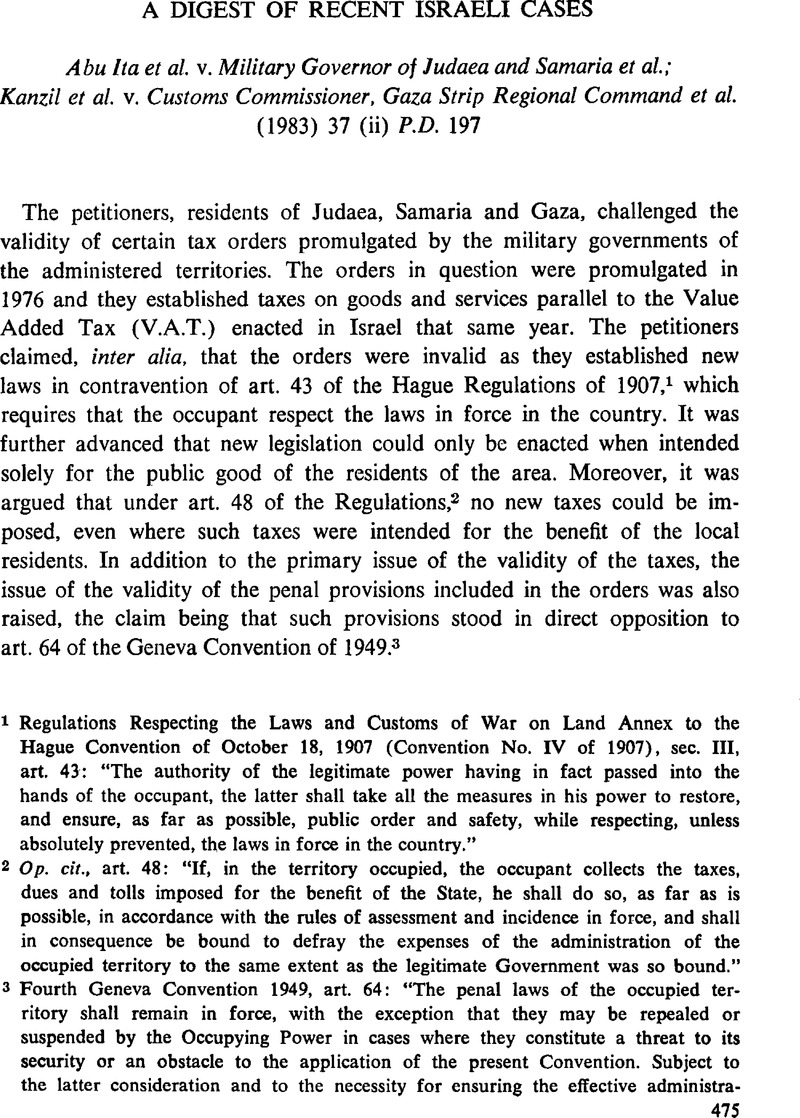Article contents
A Digest of Recent Israeli Cases
Published online by Cambridge University Press: 16 February 2016
Abstract

- Type
- Notes
- Information
- Copyright
- Copyright © Cambridge University Press and The Faculty of Law, The Hebrew University of Jerusalem 1983
References
1 Regulations Respecting the Laws and Customs of War on Land Annex to the Hague Convention of October 18, 1907 (Convention No. IV of 1907), sec. III, art. 43: “The authority of the legitimate power having in fact passed into the hands of the occupant, the latter shall take all the measures in his power to restore, and ensure, as far as possible, public order and safety, while respecting, unless absolutely prevented, the laws in force in the country.”
2 Op. cit., art. 48: “If, in the territory occupied, the occupant collects the taxes, dues and tolls imposed for the benefit of the State, he shall do so, as far as is possible, in accordance with the rules of assessment and incidence in force, and shall in consequence be bound to defray the expenses of the administration of the occupied territory to the same extent as the legitimate Government was so bound.”
3 Fourth Geneva Convention 1949, art. 64: “The penal laws of the occupied territory shall remain in force, with the exception that they may be repealed or suspended by the Occupying Power in cases where they constitute a threat to its security or an obstacle to the application of the present Convention. Subject to the latter consideration and to the necessity for ensuring the effective administration of justice, the tribunals of the occupied territory shall continue to function in respect of all offences covered by the said laws.
The Occupying Power may, however, subject the population of the occupied territory to provisions which are essential to enable the Occupying Power to fulfill its obligations under the present Convention, to maintain the orderly government of the territory, and to ensure the security of the Occupying Power, of the members and property of the occupying forces or administration, and likewise, of the establishments and lines of communications used by them.”
4 Feilchenfeld, E. H., The International Economic Law of Belligerent Occupation (New York, 1971) 49.Google Scholar
5 11 L.S.I. 157.
6 At p. 235, quoting from Shamgar, M., “Legal Concepts and Problems of Israeli Military Government” in Military Government in the Territories Administered by Israel 1967–1980 (Jerusalem, 1982) 47–48.Google Scholar
7 von Glahn, G., Law Among Nations (New York, 1981) 686.Google Scholar
8 “Ligabue v. Finanze” (1952) 19 Int'l L.R. 616, 617–618.
9 Alijamaya Almasihia v. Minister of Defence et al. (1972) 26(i) P.D. 574, 582.
- 1
- Cited by




